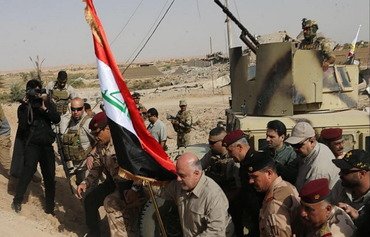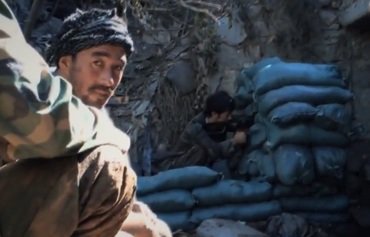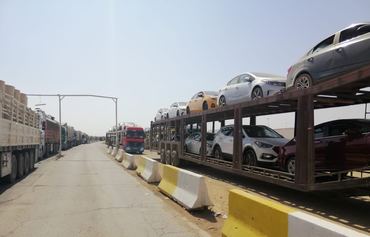Although a month has passed since the reopening of the al-Qaim border crossing between Iraq and Syria, commercial activity has not yet resumed, according to officials in Anbar province and the border authority.
They say Iran-backed armed militias fighting with Syrian President Bashar al-Assad's regime have been using the border crossing, stifling any potential commercial and economic activity.
Prior to the reopening of the land border, the militiamen travelled by air, but sanctions imposed on Iran have caused the Iranian regime to reduce the salaries of militiamen and their associated travel costs.
A hopeful reopening of the border
The "Islamic State of Iraq and Syria" (ISIS) seized the border crossing, which links Baghdad and Damascus, in 2014 when the terrorist group held large swathes of north-western Iraq.
Iraqi security forces backed by the international coalition liberated al-Qaim border post in late 2017, and it officially reopened on September 30th, 2019.
During the reopening ceremony, Director of the Iraqi Border Crossings Authority Kazim al-Aqabi said that the crossing played a significant role in terms of trade and the economic revival of the area.
The reopening will contribute to creating jobs for the local population of al-Qaim in Iraq and Albu Kamal in Syria, he said.
So far, however, there has barely been any commercial activity or tourism and travel for individuals or families, a customs official at the al-Qaim border crossing who requested anonymity told Diyaruna.
The only people using the border crossing are the Iran-backed Iraqi militiamen fighting in Syria, he said.
These individuals are members of a number of militias -- the most prominent of which are Harakat al-Nujaba, Sayyed al-Shuhada, Kataib Hizbullah and Ansar Allah al-Awfiya -- and are moving in four-wheel drive vehicles or buses, the customs official said.
The Syrian regime appears to be directly facilitating their entry into Syria, he added.
Benefiting Iran-backed militias
The reopening of the border is benefiting the militias supporting the Syrian regime, and this has no commercial or economic value, said Iraqi security expert Mohammed al-Hayani.
On the contrary, it is threatening the security and stability of Iraq, he said.
When ISIS controlled the border area, they would smuggle banned goods, weapons and ammunition between al-Qaim on the Iraqi side and Albu Kamal and al-Tanf on the Syrian side, he said.
Now that the border crossing has reopened, militants recruited by Iran to fight alongside the Syrian regime can easily travel, disguised as civilians or tourists, he said.
Syria has no agricultural or industrial products to export to Iraq, al-Hayani told Diyaruna. Moreover, imports from Turkey and Jordan are less expensive and of higher quality, not to mention easier for private businesses and the public sector to obtain from a security and financial perspective.
Tourism is also non existent between Iraq and Syria, and even when it does resume, people are not likely to choose this route due to security concerns and the length of time it takes to cross, he said.
For these reasons, al-Qaim border crossing is considered to be a crossing point in the service of pro-Iran militias and Iran has supported its reopening, al-Hayani said.
"Lebanese Hizbullah militants can also use the border crossing to travel without being detected or monitored as they secure their supply lines with Iran," he added.
Monitoring the border
After the reopening of the al-Qaim crossing, business has not picked up as hoped, said Iraqi MP Salam al-Shammari.
"Everyone is aware of the security situation in Syria and no commercial activity has resumed as a result," he told Diyaruna.
"We used to fill two vehicles with [civilian] passengers every day before 2014," said al-Banafsaj Travel and Tourism agency head Khaldoun al-Qaisi.
"But since land travel to Damascus has resumed, only nine passengers have booked their travel, which does not even pay for the fuel to transport them across the border," he told Diyaruna.
The al-Qaim crossing now services militants rather than civilians, said Ali al-Mahlawi, a former member of the Sahwa Forces, an Iraqi tribal militia formalised in 2006 to fight al-Qaeda.
Iraq is using Sahwa fighters again to ensure security in various parts of the country.
The Iraqi air force and international coalition have been monitoring illegal entry of Iran-backed militants into Syria, which is a violation of international law and UN resolutions regarding the situation in Syria, and is fuelling the conflict there, al-Mahlawi told Diyaruna.

![Members of the Syrian security forces stand guard atop a military vehicle at the newly-reopened border crossing between Albu Kamal in Syria and al-Qaim in Iraq, taken from the Syrian side in the eastern region of Deir Ezzor, on September 30th. Behind them are Syrian (L) and Iraqi national flags. [AFP]](/cnmi_di/images/2019/11/08/20802-qaim-border-crossing-600_384.jpg)






